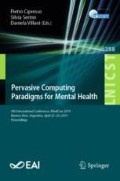Abstract
The way monitoring is performed in health settings in general and chronic pain in particular is mostly based on traditional, episodic, onsite evaluation. This assessment method has important limitations and might be negatively impacting the effectiveness of treatments by providing non-ecological, delayed, and retrospective information about the patients’ course over treatment. This pilot study explores the feasibility and discusses the utility of using technology (i.e., a smartphone app) for daily ecological momentary assessment of chronic pain patients. Twelve individuals attending a specialized pain clinic used the app twice daily for a month. Alarms were sent to the physicians in the presence of unwanted events (i.e., side effects). Feasibility was evidenced by excellent response rates in the patients (>80%) and the physicians (>93% of alarms were responded to). Utility of daily monitoring was evidenced when graphically representing patients’ responses, in which the fluctuation of pain within and across days evidences the need for daily assessment. The utility of alarms will also be discussed, considering the number of alarms received (i.e., 96), which would have remained undetected or belatedly detected with traditional assessment. The study evidences the utility and feasibility of EMA using apps both from the patients’ and the physicians’ perspective. We believe these findings are not only important for pain settings, but also relevant for other health conditions.
Access this chapter
Tax calculation will be finalised at checkout
Purchases are for personal use only
References
Merskey, H., Bogduk, N.: Classification of chronic pain, 2nd edn. IASP Press, Seattle (1994)
Breivik, H., Collett, B., Ventafridda, V., Cohen, R., Gallacher, D.: Survey of chronic pain in Europe: prevalence, impact on daily life, and treatment. Eur. J. Pain 10(4), 287–333 (2006)
Gatchel, R.J., Peng, Y.B., Peters, M.L., Fuchs, P.N., Turk, D.C.: The biopsychosocial approach to chronic pain: scientific advances and future directions. Psychol. Bull. 133(4), 581 (2007)
Turk, D.C.: Clinical effectiveness and cost-effectiveness of treatments for patients with chronic pain. Clin. J. Pain 18(6), 355–365 (2002)
Dansie, E.J., Turk, D.C.: Assessment of patients with chronic pain. Br. J. Anaesth. 111(1), 19–25 (2013)
Gorin, A.A., Stone, A.A.: Recall biases and cognitive errors in retrospective self-reports: a call for momentary assessments. Handbook Health Psychol. 23, 405–413 (2001)
Schwarz, N.: Retrospective and concurrent self-reports: the rationale for real-time data capture. The science of real-time data capture: Self-reports in health research. In: Stone, A., Shiffman, S.S., Atienza, A., Nebeling, L. (eds.). Oxford University Press, New York (2007)
Shiffman, S., Stone, A.A., Hufford, M.R.: Ecological momentary assessment. Annu. Rev. Clin. Psychol. 4, 1–32 (2008)
Smyth, J.M., Stone, A.A.: Ecological momentary assessment research in behavioral medicine. J. Happiness Stud. 4(1), 35–52 (2003)
Stone, A.A., et al.: A comparison of coping assessed by ecological momentary assessment and retrospective recall. J. Pers. Soc. Psychol. 74(6), 1670 (1998)
May, M., Junghaenel, D.U., Ono, M., Stone, A.A., Schneider, S.: Ecological momentary assessment methodology in chronic pain research: a systematic review. J. Pain 19(7), 699–716 (2018)
Reynoldson, C., et al.: Assessing the quality and usability of smartphone apps for pain self-management. Pain Med. 15(6), 898–909 (2014)
Rosser, B.A., Eccleston, C.: Smartphone applications for pain management. J. Telemedicine Telecare 17(6), 308–312 (2011)
Suso-Ribera, C., Castilla, D., Zaragozá, I., Ribera-Canudas, M.V., Botella, C., García-Palacios, A.: Validity, reliability, feasibility, and usefulness of pain monitor. Clin. J. Pain 34(10), 900–908 (2018)
Dworkin, R.H., et al.: Core outcome measures for chronic pain clinical trials: IMMPACT recommendations. Pain 113, 9–19 (2005)
Alexander, J., Joshi, G.: Smartphone applications for chronic pain management: a critical appraisal. J. Pain Res. 9, 731–734 (2016)
Cleeland, C.S., Ryan, K.M.: Pain assessment: global use of the Brief Pain Inventory. Ann. Acad. Med. Singapore 23, 129–138 (1994)
McNair, D., Lorr, M., Droppleman, L.: Profile of Mood States. Educational and Industrial Testing Service, San Diego (1971)
Zigmond, A.S., Snaith, R.P.: The hospital anxiety and depression scale. Acta Psychiatr. Scand. 67, 361–370 (1983)
Ware, J., Kosinski, M., Keller, S.D.: A 12-Item Short-Form Health Survey: construction of scales and preliminary tests of reliability and validity. Med. Care 34, 220–233 (1996)
Sullivan, M.J.L., Bishop, S., Pivik, J.: The pain catastrophizing scale: development and validation. Psychol. Assess. 7, 524–532 (1995)
Mccracken, L.M., Vowles, K.E., Eccleston, C.: Acceptance of chronic pain: component analysis and a revised assessment method. Pain 107, 159–166 (2004)
Waddell, G., Newton, M., Henderson, I., Somerville, D., Main, C.J.: Fear-Avoidance Beliefs Questionnaire (FABQ) and the role of fear-avoidance beliefs in chronic low back pain and disability. Pain 52, 157–168 (1993)
Roland, M., Morris, R.: A study of the natural history of back pain. Part I: development of a reliable and sensitive measure of disability in low-back pain. Spine 8, 141–144 (1983)
Romano, J.M., Jensen, M.P., Turner, J.A.: The Chronic Pain Coping Inventory-42: reliability and validity. Pain 104, 65–73 (2003)
Rosenstiel, A.K., Keefe, F.J.: The use of coping strategies in chronic low back pain patients: Relationship to patient characteristics and current adjustment. Pain 17, 33–44 (1983)
Stone, A.A., Broderick, J.E., Kaell, A.T.: Single momentary assessments are not reliable outcomes for clinical trials. Contemp. Clin. Trials 31(5), 466–472 (2010)
Garcia-Palacios, A., et al.: Ecological momentary assessment for chronic pain in fibromyalgia using a smartphone: a randomized crossover study. Eur. J. Pain 18(6), 862–872 (2014)
Kratz, A.L., Murphy, S.L., Braley, T.J.: Ecological momentary assessment of pain, fatigue, depressive, and cognitive symptoms reveals significant daily variability in multiple sclerosis. Arch. Phys. Med. Rehabil. 98(11), 2142–2150 (2017)
Author information
Authors and Affiliations
Corresponding author
Editor information
Editors and Affiliations
Rights and permissions
Copyright information
© 2019 ICST Institute for Computer Sciences, Social Informatics and Telecommunications Engineering
About this paper
Cite this paper
Jaén, I., Suso-Ribera, C., Castilla, D., Zaragoza, I., García-Palacios, A. (2019). Feasibility and Utility of Pain Monitor: A Smartphone Application for Daily Monitoring Chronic Pain. In: Cipresso, P., Serino, S., Villani, D. (eds) Pervasive Computing Paradigms for Mental Health. MindCare 2019. Lecture Notes of the Institute for Computer Sciences, Social Informatics and Telecommunications Engineering, vol 288. Springer, Cham. https://doi.org/10.1007/978-3-030-25872-6_15
Download citation
DOI: https://doi.org/10.1007/978-3-030-25872-6_15
Published:
Publisher Name: Springer, Cham
Print ISBN: 978-3-030-25871-9
Online ISBN: 978-3-030-25872-6
eBook Packages: Computer ScienceComputer Science (R0)

